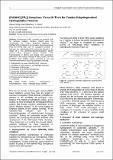Files in this item
[Pd(NHC)(PR3)] complexes : versatile tools for tandem dehydrogenation-hydrogenation processes
Item metadata
| dc.contributor.author | Songis, Olivier | |
| dc.contributor.author | Cazin, Catherine S.J. | |
| dc.date.accessioned | 2014-09-16T23:01:42Z | |
| dc.date.available | 2014-09-16T23:01:42Z | |
| dc.date.issued | 2013-09-17 | |
| dc.identifier | 136182885 | |
| dc.identifier | 3efff3ab-ac02-42ec-8ecc-97da17b1d01f | |
| dc.identifier | 000325540000002 | |
| dc.identifier | 84883809595 | |
| dc.identifier.citation | Songis , O & Cazin , C S J 2013 , ' [Pd(NHC)(PR3)] complexes : versatile tools for tandem dehydrogenation-hydrogenation processes ' , Synlett , vol. 24 , no. 15 , pp. 1877-1881 . https://doi.org/10.1055/s-0033-1339669 | en |
| dc.identifier.issn | 0936-5214 | |
| dc.identifier.uri | https://hdl.handle.net/10023/5421 | |
| dc.description | This work is supported in part by funding from the EPSRC UK | en |
| dc.description.abstract | Homogeneous Pd(0) complexes are powerful tools for numerous catalytic reactions. Recent work has demonstrated the unique properties displayed by [Pd(NHC)(PR3)] catalysts in the activation of ammonia borane (AB) and formic acid, with the subsequent formation of hydrogen. An understanding of the mechanism allowed for the design of a new dehydrogenation-hydrogenation tandem process using hydrogen storage materials'. The hydrogenations of alkenes and alkynes were successfully performed at low catalyst loadings of Pd(0) species and mild conditions. Such tandem process represents a safe and innovative alternative to classic hydrogenation protocols. | |
| dc.format.extent | 5 | |
| dc.format.extent | 695314 | |
| dc.language.iso | eng | |
| dc.relation.ispartof | Synlett | en |
| dc.rights | © 2013. Georg Thieme Verlag Stuttgart · New York. This is an Accepted Manuscript of an article published in the Synlett on 17 September 2013, available online: https://www.thieme-connect.de/products/ejournals/abstract/10.1055/s-0033-1339669 | en |
| dc.subject | Tandem reaction | en |
| dc.subject | Hydrogenation | en |
| dc.subject | Dehydrogenation | en |
| dc.subject | Pd(0) | en |
| dc.subject | Hydrogen storage material | en |
| dc.subject | N-heterocyclic carbene | en |
| dc.subject | Asymmetric hydrogenation | en |
| dc.subject | Catalysts | en |
| dc.subject | Palladium | en |
| dc.subject | NHC | en |
| dc.subject | Route | en |
| dc.subject | QD Chemistry | en |
| dc.subject.lcc | QD | en |
| dc.title | [Pd(NHC)(PR3)] complexes : versatile tools for tandem dehydrogenation-hydrogenation processes | en |
| dc.type | Journal article | en |
| dc.contributor.sponsor | The Royal Society | en |
| dc.contributor.institution | University of St Andrews.School of Chemistry | en |
| dc.contributor.institution | University of St Andrews.EaSTCHEM | en |
| dc.identifier.doi | 10.1055/s-0033-1339669 | |
| dc.description.status | Peer reviewed | en |
| dc.date.embargoedUntil | 2014-09-17 | |
| dc.identifier.grantnumber | UF100691 | en |
This item appears in the following Collection(s)
Items in the St Andrews Research Repository are protected by copyright, with all rights reserved, unless otherwise indicated.

